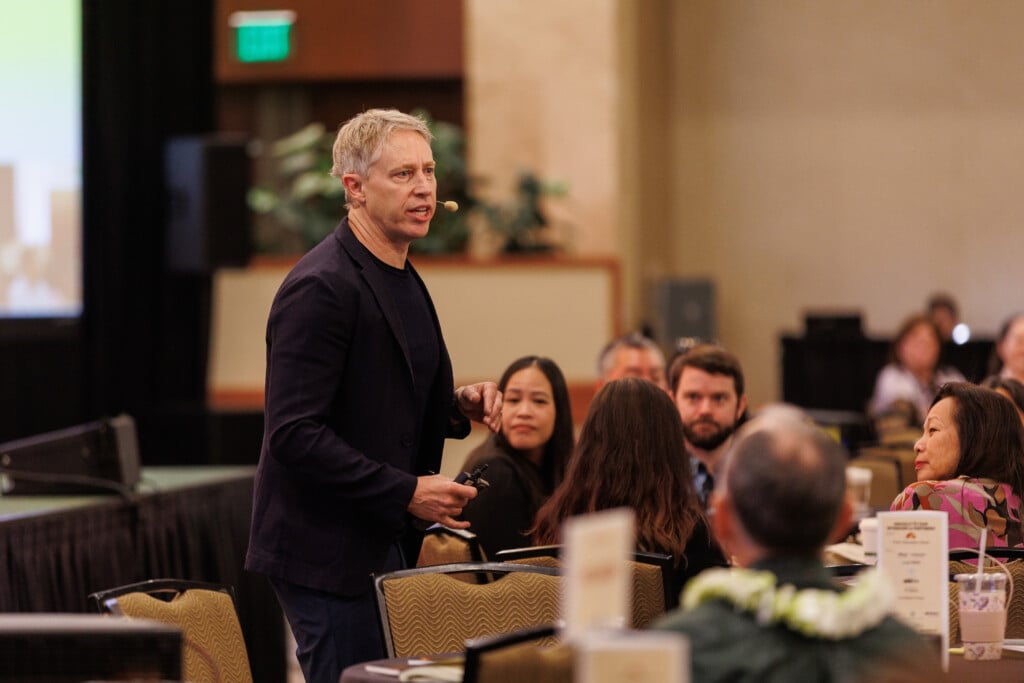How to Grow Your Business? Waste Money
Management guru Luke Williams says companies need to rethink everything about their businesses to stay competitive, including staying in the game by investing in "wasteful" learning.

Luke Williams says you need to waste money to save your business.
That was the unorthodox prescription the keynote speaker offered to nearly 500 attendees at the Hawaii Business Leadership Conference at the Hilton Hawaiian Village.
Williams, a globally recognized expert on innovation, urged executives to move beyond their fixation on ROI — return on investment.
“Equally as important, perhaps more important these days, is return on learning,” Williams said at the conference in late July. “Every organization in America needs to accelerate their rate of learning. If you can learn at the pace of change, you have an advantage. But if your learning falls below the pace of change, you fall further and further behind. And that’s where we get into real trouble.
“So in order to accelerate the rate of learning, you need waste.”
The author of “Disrupt: Think the Unthinkable to Spark Transformation in Your Business” cited a litany of companies that went bankrupt or lost their edge because they failed to keep innovating.
Williams said so-called “disruptive thinking” among employees leads to uncertain results, and not all ideas need to be implemented right away, or ever.
“But you’ve got to break the cycle of incremental thinking,” the idea that today’s successful ideas will continue to serve you well into the future.
In an interview after his speech, Williams expanded upon the idea.
“Disruptive ideas, if the advantages are clear, they’re no longer high risk,” Williams said. “They’re really risking the thinking time, and that’s a matter of priorities.
“I think of different currencies in a business. We often think of money as the main currency, but there are different currencies. I want businesses to see ideas as their most valuable currency.”
Williams challenged attendees to go back to their companies after the conference and to encourage all of their employees to start rethinking everything about their businesses.
“If you don’t have new ideas, you don’t innovate, you can’t grow,” explained Williams who is also Adjunct Associate Professor of Marketing at the NYU Stern School of Business. “Particularly in mature economies like the U.S., they’ve got to get themselves in a position where they’ve got more ideas to spend than their competitors.
“That means as circumstances change, we’ve got more options. We can do A, B, C, D or E depending on how circumstances change, so we’ve got better optionality than our competitors.”
Williams insists no new technology needs to be invented for companies to thrive and grow.
“My message is everyone in the organization needs to have a comfortable fluency moving between the core business and introducing new business ideas,” Williams says. “That’s why I talk about discourse. It’s not the device that’s important, it’s the discourse.”
“Ideas beget ideas,” he says.
So how does a guy who tells others to endlessly innovate keep his own creative juices flowing? After all, Williams has more than 30 patents for product designs and is constantly pushing his mantra — innovate or perish.
He scoffs at the idea of waiting for some creative bolt of lightning to spring from casual imagining.
“I’m a big believer in deliberate creativity,” Williams says. “I don’t believe in shooting water pistols and getting people to take off ties and sit on bean bags. It’s exercising a muscle.”
He has recently gotten back in touch with a creative outlet he pursued when he was younger: drumming.
“I find that really helps with creativity,” Williams says, adding: “It has actually engaged different parts of the brain. … I think my aspiration is to be a jazz musician at some point. Jazz has a lot to do with creativity and improvisation.”





